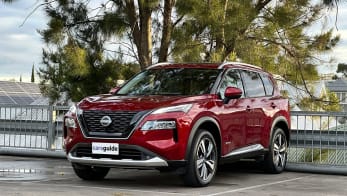It’s been an eventful few weeks for the global car industry with some notable episodes that look set to shape what we’ll be driving in the years to come.
Firstly, the European Union announced that it would proceed with its plans to effectively ban every non-electric vehicle by 2035 (although it subsequently left the door ajar for carbon-neutral synthetic fuel to be an option). Next, the US government declared it wants up to 67 per cent of all new cars to be EVs by 2032. Then, closer to home, the Federal Government finally announced it would introduce fuel efficiency standards as part of its National Electric Vehicle Strategy. And, finally, the last piece of news that grabbed my attention was General Motors’ announcement that it will stop building its smallest, most affordable EV, the Chevrolet Bolt, and replace it with an electric pick-up truck.
All this got my mind ticking over and led me to ask the same question over and over again - shouldn't we just ban SUVs?
Now, before you head to the comments section and politely tell me to ‘shut up’, ‘go back to [insert communist country]’ or something saltier, hear me out.
Firstly, I’m a motoring journalist, not a legislator or dictator, so I have no actual power to change what car you’re driving now or in the future. What I can do, though, is try and lay out my reasoning for why I think we all, as a society, need to rethink our love of the SUV.
Don’t get me wrong, I love SUVs. They are hugely practical and look great - some even drive well too. But they are, fundamentally speaking, less efficient than an equivalent passenger car. They are heavier, use more fuel, take up more space and, critically for this argument, require more resources.
So, if governments around the world are either going to outright ban internal combustion vehicles or legislate heavily against them, shouldn’t they be banning types of vehicles that are inefficient? I mean, who really needs a Land Rover Defender to do the school run if you live in the suburbs? Or who needs a Mazda CX-5 when it doesn’t offer any genuine practical advantage over a Mazda6 wagon (and before you comment, I’ve compared the two and the wagon has a bigger boot and longer wheelbase).
.jpg)
Obviously, I know this is an unpopular opinion, just looking at the sales data from 2022 shows that the overwhelming majority of you, our valued readers, are buying SUVs or utes. Last year, SUVs made up 53.1 per cent of all new vehicles sold, ahead of light-commercial vehicles (utes and vans) at 23.7 per cent, while passenger cars accounted for just 18.8 per cent.
Comparing like-for-like, we snapped up 140,044 large SUVs compared to just 4874 large passenger cars. Heck, we bought more Porsches as a nation than we did large sedans and wagons - and that large car figure includes 430 Porsche Taycans.
A recent report from independent Canberra-based think tank, The Australia Institute, summed up our love of the SUV and ute succinctly. The authors wrote in their conclusion to this country’s lack of EV take-up and favoritism for bigger vehicles: “Australians buy big dumb cars and that means we spend a lot more on petrol than we should.”
And that’s really the crux of my argument. I’m not genuinely advocating that the government should step in and tell us what cars we can and can’t buy. I don’t believe that setting an arbitrary date for all cars in Australia to switch to EVs, as they’re doing in Europe, is either feasible or legitimately a good idea here.
.jpg)
While I do believe EVs are the future - if for no other reason than Australia will be forced to follow the lead of Europe and the USA - as a country we’ll need to shift away from coal-fired energy and onto more renewable sources before it’s truly the long-term solution to cutting emissions. But, like any ‘chicken and egg’ debate, there’s an argument to be made that getting more EVs on the road will incentivise the energy sector to transition to green power sooner - but that’s a whole other story.
Ultimately, what I think we need to do as a car-buying society is to look at the cars we’re buying and ask, ‘is this the most efficient car for my needs?’. GM’s decision to axe the Chevy Bolt to prioritise building the Chevrolet Silverado EV or GMC Hummer speaks to a market that is driven by consumer tastes.
If we tell carmakers we only want large vehicles, then large vehicles are what we’ll get. And yet, as the Tesla Model 3, Hyundai Ioniq 6 and Cupra Born have all recently demonstrated, a small, aerodynamically honed sedan or hatch can be a very efficient (and very appealing) alternative to an SUV - especially as bespoke EVs often have more interior space due to the unique packaging of the smaller motors and flat battery packs.
_0.jpg)
But unless we support these types of cars by buying them, then carmakers will stick to building hulking SUVs and utes that consume more resources and energy that we really need to mitigate the advantages of switching to an EV in the first place.
Of course, many of you will need an SUV or ute, and my genuine hope is that there will be a diverse array of electric options for you to choose from in the future.
But I also hope that there are also more efficient, more compact sedans and wagons too, for those who want to make that choice.











.jpg)
.jpg)


.jpg)


.jpg)


Comments